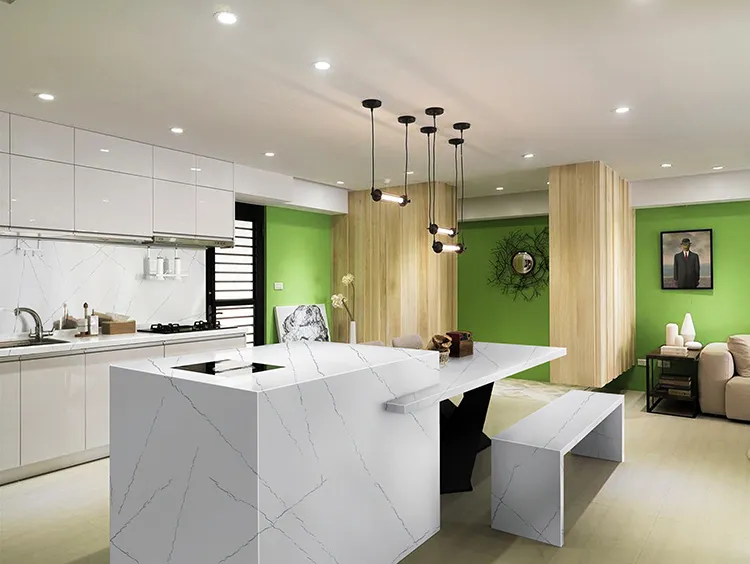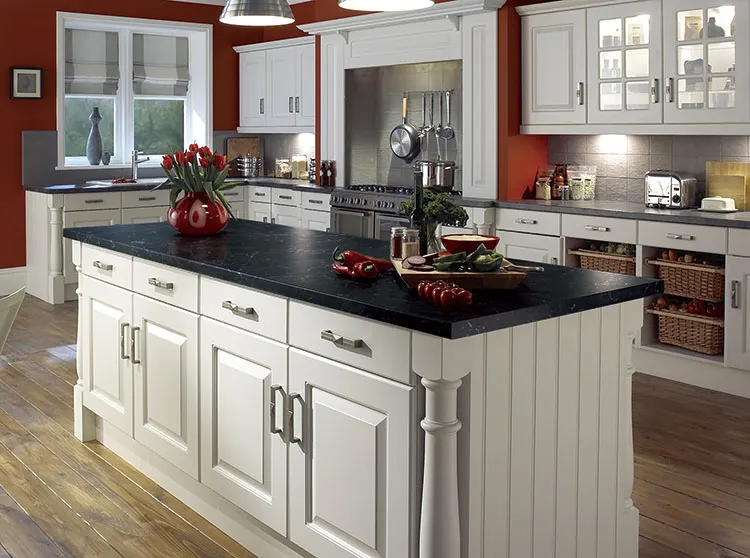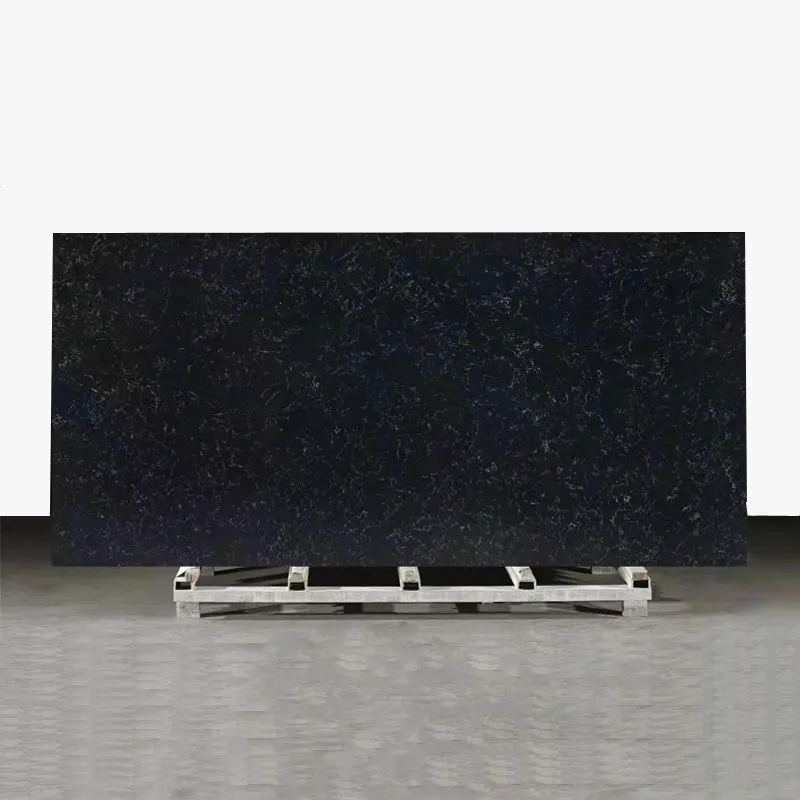In recent years, there have been more and more choices for kitchen and bathroom countertops, and consumers often face a confusing choice when choosing: marble or quartz stone countertop? Both have their own characteristics, but they are different in terms of function, appearance, durability, etc. For home decoration and commercial space design, choosing the right countertop material is crucial because it is directly related to beauty, durability, and maintenance costs after long-term use.
In this article, we will conduct an in-depth comparison of marble and quartz stone countertops to help consumers make better decisions.

Marble: A symbol of natural aesthetics
As a natural stone, marble has a unique appearance and texture, and is a luxurious element pursued by many people in decoration. The appearance of marble presents rich colors and textures due to different minerals, which makes each marble stone countertop unique. Its texture is sometimes delicate and smooth, and sometimes bold and exaggerated, giving the space a natural artistic atmosphere.
1. Beauty and uniqueness
The natural texture and luster of marble make it the first choice for many people in decoration, especially in high-end kitchen and bathroom design. The surface of marble presents natural changes, including cloud-like textures, granular mineral embellishments, etc. Since the texture of each piece of marble is different, the decoration effect of using marble as a countertop has a strong personality and uniqueness.
Compared with quartz stone, marble stone countertops have a stronger gloss and usually have a more delicate surface. The natural texture of marble adds a classic and modern fusion to the space, and is often a symbol of luxury and elegance.
2. Material composition and source
The composition of marble stone countertops is mainly formed by the transformation of limestone, dolomite or calcareous rock after high temperature and high pressure, so it contains a large amount of calcium carbonate. In nature, the mineral composition and texture of marble vary depending on the origin. Common marbles include Carrara white marble in Italy and Berke marble in France.
Since marble is a natural stone, the color, texture and mineral distribution of each stone are different, so marble stone countertops are highly personalized and unique. For consumers who pursue unique beauty, marble is undoubtedly an ideal choice.
3. Advantages and limitations
The advantages of marble stone countertops are not only reflected in their aesthetics, but also in their natural thermal stability. Marble has strong thermal conductivity, so when cooking in the kitchen, it is not easy to damage the surface when placing a hot pot on the marble stone countertop. It also has excellent UV resistance and will not change color when exposed to sunlight for a long time. However, marble also has some obvious limitations, the most notable of which is its susceptibility to corrosion by acidic substances. For example, when acidic substances such as lemon juice and vinegar come into contact with marble stone countertops, they will cause scratches or corrosion on the surface. In addition, marble stone countertops have a low hardness and are easily scratched by sharp objects, resulting in permanent marks on the surface.
Another disadvantage that cannot be ignored is the difficulty of marble maintenance. Because its surface is easily penetrated by oil or liquid, it needs to be sealed frequently during use to prevent the accumulation of water stains and stains. Therefore, marble stone countertops need to be maintained regularly, and their durability is relatively poor. After long-term use, they may appear dull in color and disappear in texture.

Quartz: The representative of modern pragmatism
Quartz is a material synthesized from natural quartz sand, resin and other raw materials under high temperature and high pressure. Compared with natural marble stone countertops, quartz is more uniform and has stronger durability, stain resistance and antibacterial properties. With the advancement of technology, quartz has gradually become the mainstream choice in the field of kitchen countertops and bathroom countertops.
1. Strong durability and stain resistance
The biggest advantage of quartz stone countertops is its durability. Unlike marble, the surface of quartz stone countertops has extremely strong hardness due to the high proportion of natural quartz. The wear resistance and scratch resistance of quartz far exceed those of natural stone, which can effectively prevent the countertop from being damaged by scratches from hard objects such as knives and pots during use.
The surface of quartz is smooth and dense, and it is not easy to penetrate oil or liquid, which makes it extremely stain-resistant. In daily use, quartz stone countertops only need to be cleaned regularly, and do not need to be sealed frequently like marble stone countertops. Quartz stone countertops are an ideal choice for kitchens and bathrooms that require frequent cleaning and hygiene.
2. Material diversity and design freedom
Since quartz stone countertops are a man-made material, their color, texture, and surface treatment can be adjusted according to consumer needs. Therefore, quartz stone has greater flexibility and freedom in design. Whether pursuing a simple, modern monochrome design or a complex texture effect, quartz stone countertops can provide a wealth of options. By combining with resin, quartz stone can also achieve a marble-like texture effect, but with greater durability and functionality.
In addition, quartz stone countertops have high gloss and color stability, and the treated quartz stone surface is smooth and delicate, which can maintain a novel appearance for a long time. For home or commercial spaces that need to maintain the long-term beauty of the countertop, quartz stone is undoubtedly a suitable choice.
3. Low maintenance and durability
Compared with marble stone countertops, quartz stone countertops are easier to maintain. Because its surface is dense and not easy to absorb water, it only needs to be wiped with a damp cloth for daily cleaning, avoiding the troubles caused by acid corrosion, scratches, etc. In addition, quartz is also highly resistant to UV rays and is not easy to fade, so its color and appearance can remain stable for a longer time.
Quartz also performs well in heat resistance. Although quartz countertops cannot be as high-temperature stable as marble countertops, pots and pans at normal cooking temperatures will not cause significant damage to quartz countertops. For home and commercial kitchens, quartz can provide a fairly high level of reliability.

Marble and quartz: Which is the best countertop?
1. Beauty and design
The natural texture and rich color changes of marble give it unique advantages in beauty and design. Each marble countertop is a work of art in nature, full of personality and natural beauty. Quartz countertops have greater freedom in color and texture due to their artificially adjustable design effects. Whether pursuing luxury or modern minimalist style, quartz can provide more choices.
2. Durability and maintenance
From the perspective of durability and maintenance, quartz countertops are obviously superior to marble countertops. Quartz stone is more scratch-resistant and stain-resistant, not easily corroded by acidic substances, and easier to clean. Although marble stone countertops have an elegant appearance, they require more maintenance in daily use, especially when used in the kitchen, they need to be careful to avoid erosion by liquids and acidic substances.
3. Cost and cost-effectiveness
The cost of marble stone countertops is usually high, especially imported high-end marble stone countertops, which are much more expensive than quartz stone countertops. Although there is a certain gap in price, quartz stone has a higher cost-effectiveness, especially in terms of maintenance and durability, making quartz stone the first choice for many consumers.

Discover the perfect combination of quality and affordability with Rongguan’s range of building materials. From sleek quartz stone countertops to durable terrazzo flooring and clay roof tiles, we manufacture products designed to withstand the test of time. Based in Foshan, our factory boasts cutting-edge production lines and a team of skilled technicians dedicated to meeting the demands of global buyers. With clients in over 20 countries, including the EU, Middle East, and Southeast Asia, we provide reliable supply chains, promotional discounts, and exceptional customer service.

